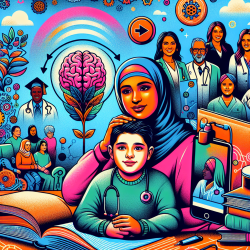Empowering Change: Bridging the Gap in Psychiatric Workforce
The psychiatric workforce shortage in the United States has been a persistent challenge, impacting the delivery of essential mental health services. As practitioners dedicated to improving outcomes for children, it is crucial to explore innovative strategies that address these workforce gaps. The research article "Addressing Psychiatry Workforce Needs: Where Are We Now?" provides valuable insights into overcoming these challenges and highlights the importance of data-driven decisions in shaping the future of mental health care.
Understanding the Current Landscape
According to the research, the shortage of psychiatrists, particularly in subspecialties like child psychiatry, addiction, and geriatrics, is well-documented. The August 2022 issue of Academic Psychiatry outlines evidence-based analyses and programs designed to tackle these obstacles. A key takeaway is the need to increase psychiatry residency training slots, which requires understanding both obstacles and opportunities. The primary motivation for starting or expanding programs is the shortage of psychiatrists in specific geographic areas, with funding being a critical factor.
Innovative Solutions: Telepsychiatry and Collaborative Care
Telepsychiatry emerges as a promising solution to address the maldistribution of psychiatrists. By leveraging technology, practitioners can reach underserved areas, ensuring children receive timely and effective care. The integration of telepsychiatry into training programs is vital, as it equips future psychiatrists with the skills needed to navigate the digital landscape of mental health care.
Collaborative or integrative care models also play a significant role in addressing workforce shortages. Training non-psychiatrists, such as nurse practitioners and physician assistants, in mental health care can alleviate the burden on psychiatrists and improve access to services. This approach fosters a multidisciplinary environment, enhancing the quality of care for children.
Advocacy and Funding: A Call to Action
Advocacy at the national level is essential to secure funding for expanding residency programs. The Resident Physician Shortage Reduction Act of 2021, which proposes adding 2,000 Medicare-funded residency positions annually, is a step in the right direction. Psychiatrists and organizations should raise their voices in support of this bill, emphasizing the need to allocate resources to psychiatry and its subspecialties.
Furthermore, identifying underutilized funding sources and advocating for their allocation to psychiatric programs can drive significant change. Partnerships with private health care systems and academic institutions can provide additional resources, ensuring the sustainability of training programs.
Future Directions: Enhancing Training and Retention
To address workforce shortages effectively, it is crucial to focus on training and retaining a talented faculty pool. Programs must incorporate telepsychiatry, collaborative care, and advanced practice provider training into their curricula. Additionally, enhancing recruitment efforts for diverse candidates can enrich the psychiatric workforce, providing culturally competent care to diverse populations.
As we move forward, continuous research and advocacy are essential to ensure that psychiatric training programs evolve to meet the demands of a changing healthcare landscape. By embracing innovation and collaboration, we can create a future where every child has access to the mental health care they deserve.
To read the original research paper, please follow this link: Addressing Psychiatry Workforce Needs: Where Are We Now?










